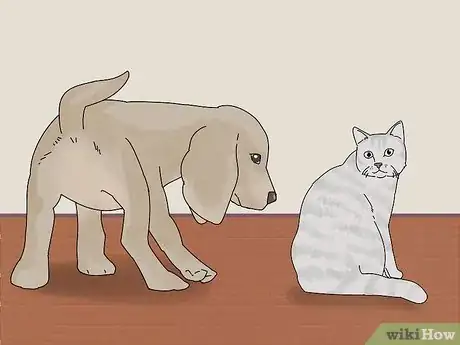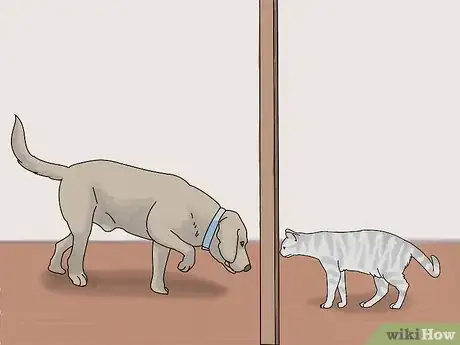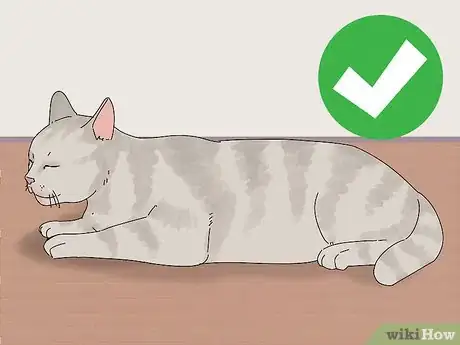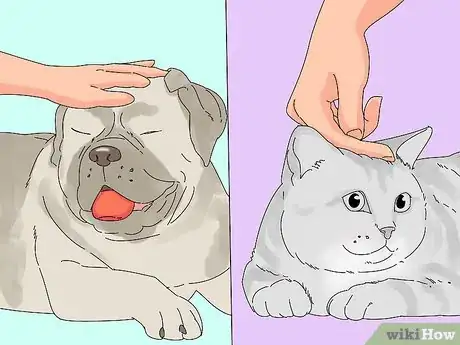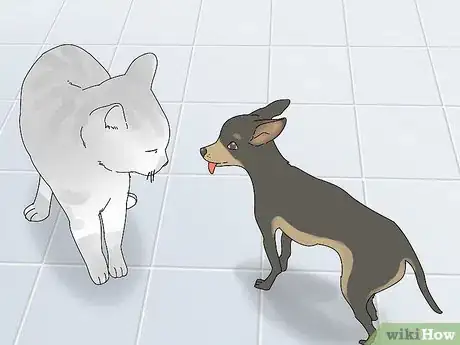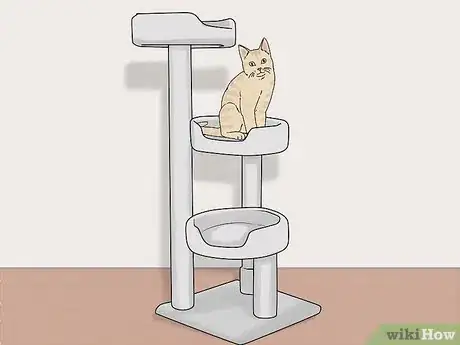This article was co-authored by Dominik Feichtner. Dominik Feichtner is a Professional Dog Trainer and Behaviorist and the Owner of The Dog Behaviorist NYC out of New York, New York. With over eight years of experience working with dogs, Dominik specializes in general obedience, behavior modification, and puppy training. His commitment to a balanced, common-sense approach led to his recognition as one of the “Best Dog Trainers in Brooklyn” and one of the “Best Dog Trainers in NYC” by Pooch and Harmony in 2020.
wikiHow marks an article as reader-approved once it receives enough positive feedback. This article received 26 testimonials and 91% of readers who voted found it helpful, earning it our reader-approved status.
This article has been viewed 960,763 times.
Thinking of getting a dog but afraid your cat won't like it? Have a cat and a dog but the two just won't stop fighting? While many cats and dogs don't get along right off the bat, there are ways to help them adjust to living with each other. By taking your time and understanding what both of your pets need, you can create a happy, peaceful home with both a cat and a dog.
Steps
Introducing a Dog and Cat for the First Time
-
1Go slow. Do NOT just let your dog chase your cat around. Keep the pets separate at first, waiting 3 or 4 days before actually introducing the animals face to face.[1] Animals need time to get to know each other's smells and to get to know new homes before they can deal with getting to know another animal.
- Cats and dogs are much more likely to fight or be unhappy if you try to force them together suddenly. Keep them in separate rooms and out of sight of one another until they are both calm.
- Begin mixing the animals smells by stroking the cat then stroking the dog and vice versa (with pets in separate rooms).
-
2Alternate the rooms you keep the animals in. This is so they can sniff where each other has been without the other animal being present. Smells are a very important way that animals get to know each other. Let your animals get to know the other's smell before they actually get to know them face to face.
- Try rubbing a towel on your dog and then putting the towel under your cat's bowl. This will help your cat get used to the dogs smell and accept it.
Advertisement -
3Let the cat and dog smell each other under the door dividing them.[2] This will help them associate the new smells they are smelling with a specific animal, even if they can't actually see it.
- Try feeding the cat and dog on separate sides of the same door.[3] This will force them to adjust to the smell of the other animal.
-
4Wait to introduce your cat and dog until the cat seems relaxed and ready.[4] If the cat is frightened and runs and hides whenever the dog gets near the door to their room, you need to give the cat more time. When the cat is adjusted to the smell and sounds of the dog, it may be time to let them see each other.
-
5Hold your cat in your arms until it is calm and relaxed. Then ask a family member or friend to slowly bring your dog on a leash into the room. Gradually bring the dog closer in small steps, waiting for your cat and dog to both settle down as each step of the way before getting closer. Do not let the animals make physical contact with each other, just get them used to the presence of the other.
-
6Show your pets equal amounts of love as you introduce them to each other. Animals, like people, get jealous when 'the new kid' gets more attention than them. Show both of your pets that they are loved by you and that the other animal is not feared by you.
-
7Separate your pets once again. Don't force them to interact for too long, this will just exhaust them, which can lead to conflict. Make sure the first meeting is a good one by keeping it brief and pleasant.
- Gradually increase the lengths of these sessions.[7]
-
8Continue to have your dog and cat interact until they are relaxed in each other's presence. Once the cat seems comfortable enough, keep the dog on a leash but let the cat go loose in the room.[8] After several weeks of this, your dog should be trained not to go after the cat, as so you can let the dog off the leash as well.
- You can also use pheromones, available through your veterinarian, to help both animals stay calm and relaxed. Ask your veterinarian if he or she thinks that the use of synthetic hormones could help your pets during their adjustment period.
Adjusting Your Pets to Life Together
-
1Separate your pets when you are not home or with them. You should do this for quite awhile so that your cat and dog do not injure each other.
-
2Redirect negative behaviors that your dog directs at your cat. This includes rough play and barking.[9] Give your pup another activity or do some obedience training with it instead of letting it focus on the cat.
- Try to avoid scolding your dog in this circumstance. Keep the situation positive and your dog is more likely to have positive associations with the cat in the future.[10]
-
3Reward and praise your dog for good behavior around the cat. This can include friendly behavior or simply ignoring the cat. Make it so that when the cat comes into the room it's enjoyable for your dog to treat the cat well, not to be aggressive or too attentive to it.
- Say, "Oh, look, Puppy, Kitty's here! Yay!" and sound very happy. Then give the dog a small training treat. Your dog will soon learn to associate pleasant feelings with the cat.
-
4Provide your cat with a place where it can always get out of reach of your dog. This can include a cat tree or a baby gate across a doorway, whatever allows your cat to escape.[11] Cats will generally attack a dog only when backed into a corner with no way to avoid the dog.
-
5Have realistic expectations. If your dog or your cat has never lived with another animal before, it will not immediately know how to deal with the situation. In addition, you will not know until they are introduced whether your dog will see the cat as play, prey, or a curiosity and you will not know whether your cat will see your dog as a curiosity or a threat.[12] Understanding that you may have a long period of acclimation between the two will help you to persevere with the process of making them get along.
Expert Q&A
-
QuestionWhat dog breeds don't do well with cats?
 Dominik FeichtnerDominik Feichtner is a Professional Dog Trainer and Behaviorist and the Owner of The Dog Behaviorist NYC out of New York, New York. With over eight years of experience working with dogs, Dominik specializes in general obedience, behavior modification, and puppy training. His commitment to a balanced, common-sense approach led to his recognition as one of the “Best Dog Trainers in Brooklyn” and one of the “Best Dog Trainers in NYC” by Pooch and Harmony in 2020.
Dominik FeichtnerDominik Feichtner is a Professional Dog Trainer and Behaviorist and the Owner of The Dog Behaviorist NYC out of New York, New York. With over eight years of experience working with dogs, Dominik specializes in general obedience, behavior modification, and puppy training. His commitment to a balanced, common-sense approach led to his recognition as one of the “Best Dog Trainers in Brooklyn” and one of the “Best Dog Trainers in NYC” by Pooch and Harmony in 2020.
Dog Trainer & Behaviorist Be wary of getting dogs with high prey drives, like German Shepherds, pit bulls, and terriers. Your cat can be in a lot of danger if your dog isn't trained on how to control their prey drive.
Be wary of getting dogs with high prey drives, like German Shepherds, pit bulls, and terriers. Your cat can be in a lot of danger if your dog isn't trained on how to control their prey drive. -
QuestionHow do I introduce my dog and cat?
 Dominik FeichtnerDominik Feichtner is a Professional Dog Trainer and Behaviorist and the Owner of The Dog Behaviorist NYC out of New York, New York. With over eight years of experience working with dogs, Dominik specializes in general obedience, behavior modification, and puppy training. His commitment to a balanced, common-sense approach led to his recognition as one of the “Best Dog Trainers in Brooklyn” and one of the “Best Dog Trainers in NYC” by Pooch and Harmony in 2020.
Dominik FeichtnerDominik Feichtner is a Professional Dog Trainer and Behaviorist and the Owner of The Dog Behaviorist NYC out of New York, New York. With over eight years of experience working with dogs, Dominik specializes in general obedience, behavior modification, and puppy training. His commitment to a balanced, common-sense approach led to his recognition as one of the “Best Dog Trainers in Brooklyn” and one of the “Best Dog Trainers in NYC” by Pooch and Harmony in 2020.
Dog Trainer & Behaviorist Keep your dog in a crate when you first bring it home so it gets used to your cat being around.
Keep your dog in a crate when you first bring it home so it gets used to your cat being around. -
QuestionHow do I keep my dog and cat from fighting?
 Dominik FeichtnerDominik Feichtner is a Professional Dog Trainer and Behaviorist and the Owner of The Dog Behaviorist NYC out of New York, New York. With over eight years of experience working with dogs, Dominik specializes in general obedience, behavior modification, and puppy training. His commitment to a balanced, common-sense approach led to his recognition as one of the “Best Dog Trainers in Brooklyn” and one of the “Best Dog Trainers in NYC” by Pooch and Harmony in 2020.
Dominik FeichtnerDominik Feichtner is a Professional Dog Trainer and Behaviorist and the Owner of The Dog Behaviorist NYC out of New York, New York. With over eight years of experience working with dogs, Dominik specializes in general obedience, behavior modification, and puppy training. His commitment to a balanced, common-sense approach led to his recognition as one of the “Best Dog Trainers in Brooklyn” and one of the “Best Dog Trainers in NYC” by Pooch and Harmony in 2020.
Dog Trainer & Behaviorist Make sure you have enough space to give your cat somewhere it can escape to.
Make sure you have enough space to give your cat somewhere it can escape to.
Warnings
- Until your pets are relatively well socialized together, don't leave them home alone together. You don't want to risk one or the other being hurt when you're not home. It's easy and much safer just to close your cat or dog into a room by itself while you're gone.⧼thumbs_response⧽
References
- ↑ http://www.animalhumanesociety.org/training/introducing-dogs-and-cats
- ↑ http://www.adoptapet.com/blog/6-steps-to-introduce-a-new-cat-to-your-dog/
- ↑ http://www.animalhumanesociety.org/training/introducing-dogs-and-cats
- ↑ https://www.aspca.org/pet-care/virtual-pet-behaviorist/dog-behavior/introducing-your-dog-new-cat
- ↑ Dominik Feichtner. Dog Trainer & Behaviorist. Expert Interview. 18 March 2021
- ↑ http://www.adoptapet.com/blog/6-steps-to-introduce-a-new-cat-to-your-dog/
- ↑ http://www.adoptapet.com/blog/6-steps-to-introduce-a-new-cat-to-your-dog/
- ↑ http://www.adoptapet.com/blog/6-steps-to-introduce-a-new-cat-to-your-dog/
- ↑ https://www.aspca.org/pet-care/virtual-pet-behaviorist/dog-behavior/introducing-your-dog-new-cat
- ↑ https://www.aspca.org/pet-care/virtual-pet-behaviorist/dog-behavior/introducing-your-dog-new-cat
- ↑ Dominik Feichtner. Dog Trainer & Behaviorist. Expert Interview. 18 March 2021
- ↑ https://www.aspca.org/pet-care/virtual-pet-behaviorist/cat-behavior/introducing-your-cat-new-dog
- ↑ https://www.aspca.org/pet-care/virtual-pet-behaviorist/dog-behavior/introducing-your-dog-new-cat
- ↑ http://www.paws.org/library/cats/home-life/introducing-cat-to-dog/
About This Article
While you can’t actually make a cat and dog get along, you can help them adjust to each other by introducing them when both animals are calm and relaxed. Additionally, try to keep them in separate rooms for the first few days and let them smell each other under the door so they can adjust to each other’s smell. When your dog behaves around your cat, give it praise and a small treat to reinforce its good behavior. You should also provide your cat a place where it can be out of the dog's reach, like a cat tree or window perch. For more advice from our Veterinary reviewer, like how to redirect your dog’s negative behavior toward your cat, read on!
